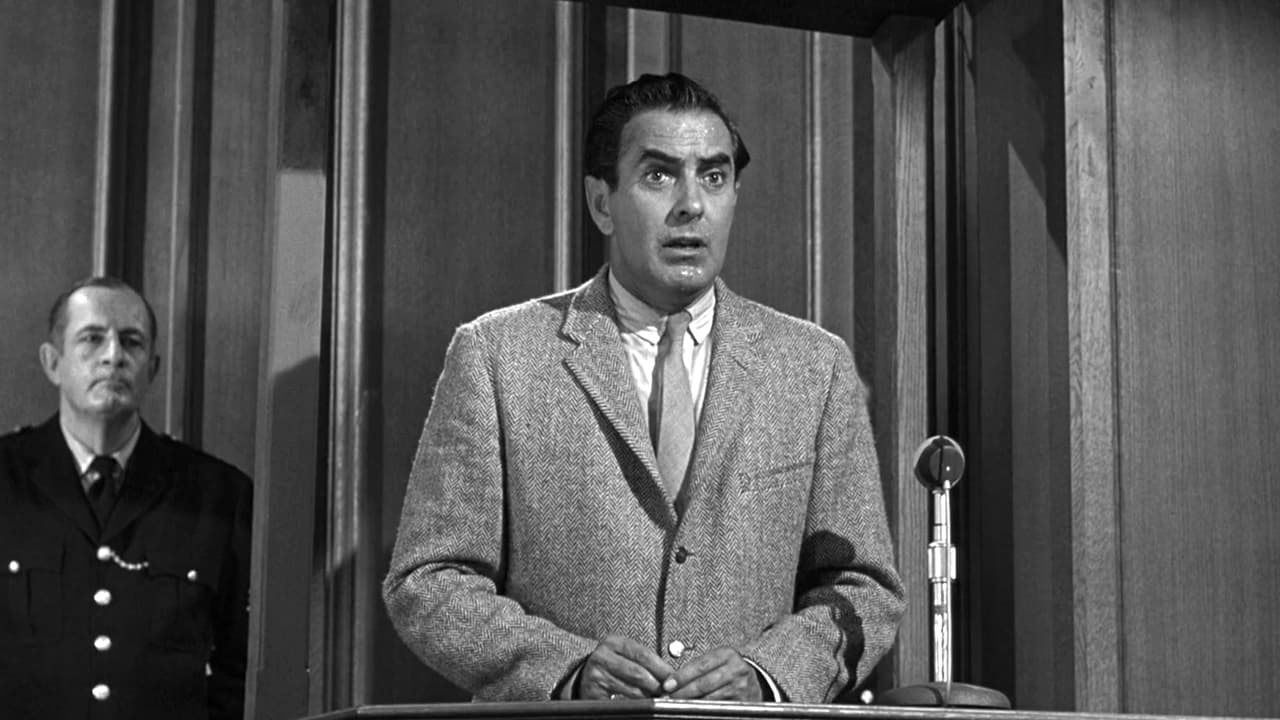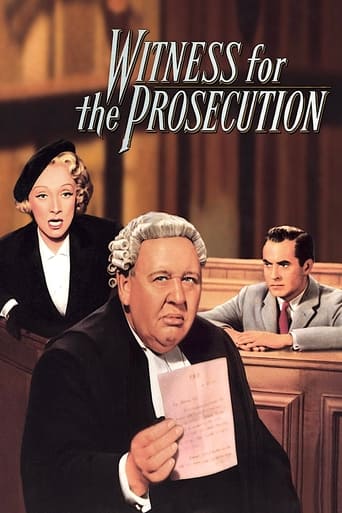IslandGuru
Who payed the critics
2hotFeature
one of my absolute favorites!
Lollivan
It's the kind of movie you'll want to see a second time with someone who hasn't seen it yet, to remember what it was like to watch it for the first time.
Edison Witt
The first must-see film of the year.
StrictlyConfidential
This 1957 courtroom drama of ultimate treachery and betrayal was frequently spoiled for me by that sniveling, pompous actor, Charles Laughton, who played the "Sir" Wilfred Roberts character.IMO - Laughton (and his insufferable blubbering) was given way-way too much screen-time. And I sure got real sick of his shtick - Real fast.As expected - Marlene Dietrich gets to do her trademark "man-drag" thing, once again, in this picture. You know, I think that she has been given the chance to do this same, tiresome business in at least a third of all the films that she has ever appeared in.*Note* - This would be Tyrone Power's final film. He died of a heart attack the following year after its release. He was 44 at the time.
Anssi Vartiainen
Originally a short story by Agatha Christie, which was then adapted into a play, which then served as the basis for this film. A down on his luck fellow named Leonard Vole (Tyrone Power) befriends an elderly widow, who just happens to be loaded. She also happens to end up dead, with Leonard blamed for the murder. Enter one elderly barrister named Sir Wilfrid Robarts (Charles Laughton), who has just gotten out of a hospital after a lengthy stay due to reasons of excessive lifestyle and bad habits. But, the case intrigues him, so he takes Mr. Vole as his client despite the protests of his nurse.Most of these courtroom dramas follow a fairly predictable pattern. Not that other genres don't have their conventions and clichés, but courtroom dramas rarely even try to hide them or shy away from them. With them the pattern is the point of it. You want the predictability, to a certain degree. You want to play along and try to guess the final outcome. Likewise with this film. Most of the running time is spent going over the case, reviewing past events, getting to know the characters.And it works. Charles Laughton especially is a blast. Sir Wilfrid is a wreck of a human being. Man consumed by vice. But then the case starts and his cunning intellect is suddenly at the forefront, his gaze unwavering and sharp.This was also Tyrone Power's last film. He would die during the filming of his next movie. But, as far as swansongs go, this is not a poor legacy to leave behind.But then, the main point of these films. The ending, when something is suddenly revealed. A key point of evidence is found, a new witness appears, someone cracks on the bench. I absolutely don't want to spoil anything, but the original story is by Agatha Christie. Trust me when I say it's wonderful.Witness for the Prosecution is a gem of its genre. Professionally crafted and entertaining, with great characters and an ending that won't leave you disappointed.
clanciai
This is actually a comedy, and its artificial intrigue and superficiality is all too transparent for anyone to be able to take it seriously. Yes, it's a murder trial, and murder is dead serious, especially since the punishment in 1952 still was death by hanging, but there are too many flaws in this case to make it credible at all. For example, if Tyrone Power didn't kill her, who did? No other candidate is ever presented, except a fabricated hypothesis of a possible thief, who anyway didn't rob anything, while the broken window clearly wasn't smashed from the outside for a break-in. The prosecutor fails to make this apparent conjecture clear as the absurdity it is and is all the way dwarfed by Charles Laughton as the lawyer.Agatha Christie was a very skillful writer, all her intrigues are logical and water-tight, but they are all superficial constructions. In comparison with Hitchcock's one great murder trial film. "The Paradine Case" (see my review) which is thoroughly organic all the way with very clearcut and convincing characters, each one humanly crippled by his own weakness, this one becomes no more than an entertainment. It is even regularly funny. Billy Wilder made some of the best films of Hollywood in his time, but at the same time all his films suffer from some non-convincing artificial superficiality. He is very seldom serious and can rarely be taken seriously, never in his later films, perhaps in his early ones, especially his maybe best film "Stalag 17" (see my review).Anyway, the film is exciting and enjoyable all the way, although they scream too much at court, also this is not very realistic, and the most enjoyable acting is between Marlene Dietrich and Charles Laughton. His wife Elsa Lanchester adds as usual a very personal touch to the comedy. It's well worth seeing again after some decades for its great entertainment value, but there are certainly more interesting murder cases on film, especially Hitchcock's very underestimated "Paradine Case".
cinemajesty
Director Billy Wilder close to his peak of career efforts, streaming elegantly frame work over the silver screen with power house actor Charles Laughton in his follow-up project after directing "Night of the Hunter (1955)" by himself. Clearly adapting Wilder's ease in the directing chair on set to create the character of lawyer Sir Wilfried Roberts.A leading character constantly challenged by his sidetracking nurse, plays out the irony on a working life with pleasures and restrictions in balance, always hunting for another cigar smoke or a shot of cognac in his thermos cup. The audience forgives him his vices by following Laughton's journey into a female-male-female triangle flashback story, where the man Leonard Vole, played by Tyrone Powers, gets accused of murdering an older woman, who relates to him as close as a perfect stranger.The lawyer takes the case of Leonard Vole on. In his process, Laughton's character learns further characters involved, including sneaky Christine, played Marlene Dietrich in trademark manner minimalist gestures and convicting glances towards any counterpart in her way. Director Billy Wilder makes great use of Dietrich's talents in another flashback scene under occupied Germany, where she gives singing homage on stage to German actor Hans Albers in his 1954er film "Reeperbahn at Night".With beat ingredients such as those, Billy Wilder already participates secretly in a futuristic world cinema approach, where filmmakers look onto each other internationally, exchanging their feelings in an universal language with releasing films. They show recognition to one another beyond national borders, which arguably had initiated the Nouvelle Vague in France just a few months later.Despite its dark subject matter of cold-blooded murder, "Witness For The Prosecution" benefits in every sense from the cast involved, elevating a rather stiff chamber scenario to an inland empire character evolution of three main character. Everything seems to be capture in one take shots. The comforted atmosphere created by director Billy Wilder especially in Sir Wilfried Roberts' office location can be exhaled with every revisit of the picture.© 2017 Felix Alexander Dausend

